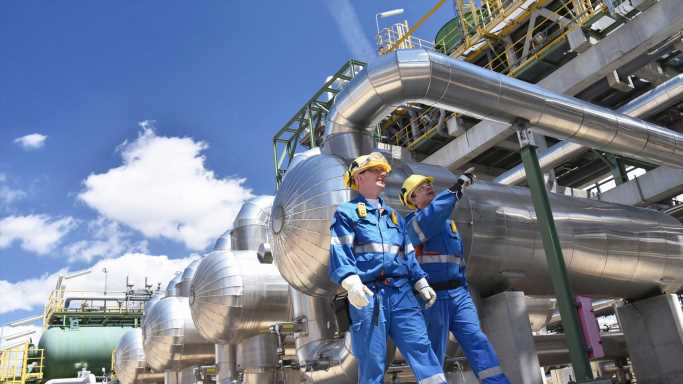Oil Price Uncertainty Ahead Makes Imperial Oil a Questionable Buy
Imperial Oil’s (CA:IMO) first-quarter results, reported on April 28, were, for the most part, a reasonable success. The company’s downstream business is performing at a very high level. If oil prices increase, the upstream business should also come around. (All figures in Canadian dollars, unless otherwise noted.)
Business is healthy enough to raise the July 2023 quarterly dividend payment by 14% to 50 cents a share. The annual payout of $2.00 yields 2.9% at the current IMO stock price. The increase marks the company’s 28th consecutive year raising its dividend.
While the dividend increase is attractive, the oil price uncertainty might not be enough to attract investors to its stock in the months ahead.
If oil prices return to $90, Imperial Oil stock should do just fine. However, all bets are off if demand continues to stall due to a global recession.
The Quarter That Was
Imperial Oil’s upstream business had a decent quarter with an overall production of 413,000 oil-equivalent barrels per day (oeb/d), up from 380,000 in Q1 2022.
Its Kearl oil sands facility — 71% owned while Exxon Mobil (US:XOM) owns 29% — set a new record in the first quarter by producing 259,000 oeb/d, up 39% from 186,000 a year ago. As a result, the operation, located north of Alberta’s Fort McMurray, has become a big part of the company’s oil production.
The problem is that the price of a barrel of Western Canada Select averaged US$51.42 in the first quarter, 36% lower than prices realized in the first quarter of last year. In addition, bitumen prices fell 44% during the quarter, ensuring that the upstream business wouldn’t make out nearly as well as a year ago.
Its upstream business generated $330 million in net income in the first quarter, less than half the segment’s $782 million profit a year ago. Prices accounted for a nearly $1 billion reduction in profits.
To make matters worse, the traditional spread between a barrel of Western Canada Select and West Texas Intermediate grew by 69% to US$24.56.
Saving the day was its downstream refining business, which saw net income more than double to $870 million from $389 million a year ago, on refining throughput of 417,000 barrels per day (96% of capacity), up from 399,000 in Q1 2022.
Imperial Oil’s profits would have been down in the quarter if not for the downstream business. Instead, they increased by 6.4% to $1.25 billion.
The Elephant in the Room
Oil and gas producers live and die with the rise and fall of oil, natural gas, and natural gas liquids (NGLs) prices. But, unfortunately, that’s part of the business. So when they’re high as they were in 2022, business is solid.
From Imperial Oil stock’s low of approximately $13 in March 2020 through its $79.83 high in November 2022, it gained 514%. However, now down 15% from its all-time high, the IMO stock price is at a crossroads.
A recent survey of 40 economists and analysts showed that the experts believe the average barrel of Brent crude in 2023 will be US$87.12, while the average West Texas Intermediate barrel will be US$82.23, at least 10% higher than their current prices.
“The main factors driving prices this year will be OPEC production cuts, the comparatively limited supply response from U.S. producers and demand developments in China,” The Globe and Mail reported the comments of Matthew Sherwood, lead commodities analyst at the Economist Intelligence Unit.
While they’re not expected to hit US$100 in 2023, a barrel of Brent crude is expected to average US$90.72 in the year’s final quarter. If that happens, look for Imperial Oil to generate much higher profits in the second half of 2023.
However, current recession fears and another Federal Reserve rate hike have sent oil prices lower, not higher.
“The failure to reach more solid ground above $80.50 in Brent points to continued selling interest amid the well known growth/demand concerns,” CNBC reported comments from Ole Hansen, head of Commodity Strategy at Saxo Bank.
Given the economic uncertainty for the remainder of 2023 — two-thirds of economists believe a global recession is likely — Imperial Oil’s latest results suggest its share price moving higher is anything but a sure thing.
This article originally appeared on Fintel
Sponsored: Tips for Investing
A financial advisor can help you understand the advantages and disadvantages of investment properties. Finding a qualified financial advisor doesn’t have to be hard. SmartAsset’s free tool matches you with up to three financial advisors who serve your area, and you can interview your advisor matches at no cost to decide which one is right for you. If you’re ready to find an advisor who can help you achieve your financial goals, get started now.
Investing in real estate can diversify your portfolio. But expanding your horizons may add additional costs. If you’re an investor looking to minimize expenses, consider checking out online brokerages. They often offer low investment fees, helping you maximize your profit.
Source: Read Full Article

